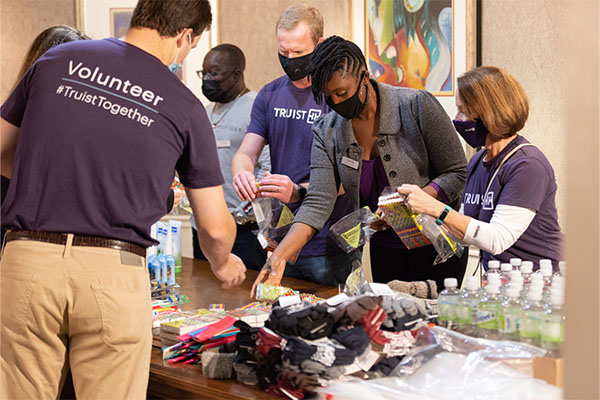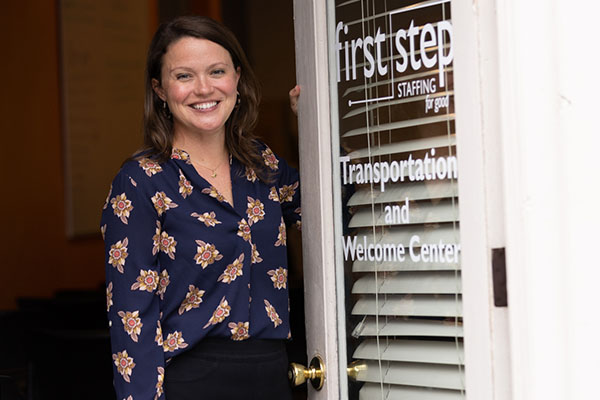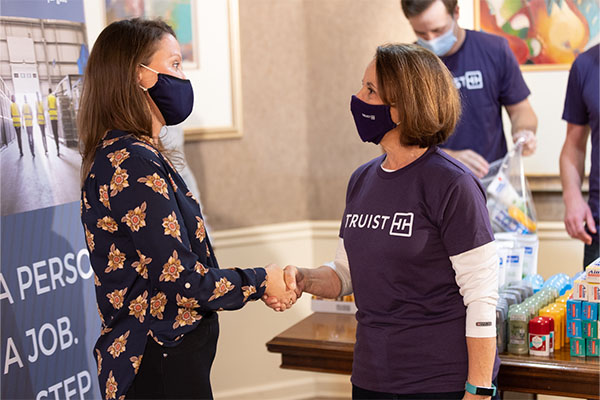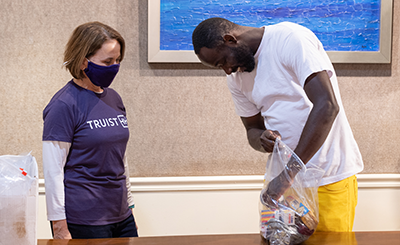
The city of Atlanta has grown significantly in recent decades—an increase that’s placing a strain on the housing market. Since 2010, the city’s population has increased from 420,000 to 500,000.1 But only 17,500 new housing units have been built in that time, with fewer than 20% qualifying as affordable housing. For the 40% of households that earn less than $45,000 per year, paying rent may consume the bulk of their income, resulting in high housing vulnerability.
That’s why First Step Staffing is on a mission to end the cycle of poverty and homelessness by removing barriers to employment.
Economic opportunity for all

First Step’s call for help was right on time for the Truist Lighthouse Project team.
First Step Staffing, the largest nonprofit employment agency in the country, was founded in Atlanta in 2007. It has since expanded to five other cities, providing nearly 1,900 individuals with employment each week. First Step’s clients are paid weekly and earn between $11.25 and $30 an hour. The agency also provides other services, including job and life coaching, transportation, and housing placement assistance. The primary goal is to find jobs for people within 24 to 72 hours, changing many lives overnight.
During orientation, participants receive some basic necessities to help them get off to a good start in their new positions. The packages generally include toothbrushes, soap, hairbrushes, socks, mouthwash, and other personal hygiene items.
“These seem like small things, but it literally may be the make or break if somebody can go to work the next day,” said First Step Staffing CEO Amelia Nickerson.
Like many nonprofits, First Step’s resources were stretched by the pandemic. As many organizations shut down or shifted to a work-from-home model, First Step remained open, finding jobs for participants in essential roles throughout the city. But with donations dwindling and care drives halted because of social-distancing protocols, the agency greatly needed more hygiene kits.
Ensuring clients have the resources to succeed from day one

For 15 years, Truist has led an annual Lighthouse initiative, a humanitarian effort that selects local programs to fund and support. Tammy Hughes, Truist relationship manager for not-for-profit and government, was excited to lead this project. While the team usually spreads their efforts across groups, Hughes wanted to focus on organizations that were still recovering from the previous year.
Since 2015, Truist has been invested in First Step’s mission in various ways, from being a financial partner to providing volunteers and board members.
“We wanted to make sure we’re not only providing them with the financial needs they have, but also help with the everyday needs their clients have,” said Adriana Lawton, Truist vice president of not-for-profit and government banking.
Hughes and the team donated $1,000 worth of personal care and hygiene products and Truist teammates packaged the items into kits for First Step.
LaShonda Raybon, Truist treasury consultant, was inspired by the agency and eager to give back.
“To go through training and then within 24 to 72 hours be placed in a new job, that’s true hope to someone who feels hopeless,” said Raybon. “Those 1,900 placements, aren’t just a number; those are people with hopes and dreams, and fears and goals, and a purpose.”
A fair wage equals an equitable start

Joseph Parker is one of First Step’s clients. Parker was hesitant to talk about his past, but his face lit up when discussing his plans for the future. In just four months, Parker went from earning $10 to $15 an hour and said he finally found a job where he feels like he belongs.
“They welcomed me in, took a chance with me,” he said. “They are just like family there; I feel comfortable with them.”
Parker is also learning career-defining skills, such as how to operate a forklift and cherry picker, and believes he’ll soon have what it takes to lead his peers.
“Hopefully, in the next six months, I’ll be a supervisor or training other people,” he said.
Investing in Atlanta with a purpose
For Lawton, what motivates her is creating real impact and partnering with organizations in Atlanta that are making a difference in the community.
“Being a bank with deep roots in in Atlanta, we really want to make sure we take care of our fellow citizens because that’s our purpose: to inspire and build better communities,” she said.
The Truist team plans to continue initiatives like the Lighthouse Project and is also assessing information and data to identify the city’s most pressing needs to organize support in new ways.
“We’re doing lots of things,” said Hughes. “We serve on many not-for-profit and service organization boards.”
Read more to discover how we’re building better lives with care in Atlanta.
1 “Examining Atlanta’s Affordable Housing Shortage,” The Annie E. Casey Foundation, May 3, 2021.